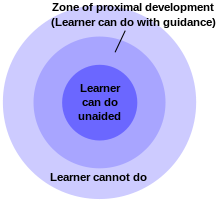Glossary: International Teaching Terms
Educators around the world use a variety of phrases and acronyms. Add yours to this glossary.

Special | A | B | C | D | E | F | G | H | I | J | K | L | M | N | O | P | Q | R | S | T | U | V | W | X | Y | Z | ALL
Z |
|---|
Zap or SapTeachers need to zap learners interest rather than sap their energy. Inspire rather than deflate, connect rather than disengage.
| ||
ZIPVerb
Noun
| |
zoomTo change from a distant view to a more close-up view (zoom in) and vice versa (zoom out). | |
ZPDThe Zone of Proximal Development (ZPD) is the difference between what a learner can do without help and what he or she can do with help. This concept was introduced by a Soviet psychologist Lev Vygotsky (1896–1934). Vygotsky believed that education's role is to give children experiences that were within their zones of proximal development, thereby encouraging and advancing their individual learning.
| ||
ZYSZYS: Zonkin' Yellow Screamer: guitar overdrive pedal
| |


